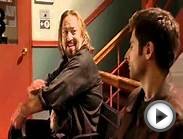Few people would choose to spend their time inside the walls of a prison, but it's all in a day's work for David Krassner. As a staff psychiatrist at the California Men's Colony State Prison in San Luis Obispo, Krassner tends to the mental health needs of those locked away by society: men convicted of murder, rape, assault, kidnapping, arson or other crimes.
LiveScience: How did you come to work in the prison system?
Krassner: I was working in community mental health services for the county and was just looking for a change. I had a friend who worked here at the prison, someone I knew from training. I talked to him and he suggested just coming to check it out. And I did and I liked it, so I signed on.
I never even considered working in a prison before I came over here five years ago, but now that I'm in it, it's like, wow. It's a different world.
LiveScience: What appealed to you about working in a prison?
Krassner: There were a couple things. One is that guys in prison don't have a choice really about where they get their care, so it seemed like good work in the sense of doing service for an underserved community. In addition, it was something different. It was a new challenge.
LiveScience: What sort of mental health issues do you see in inmates?
Krassner: Primarily schizophrenia, schizo-affective disorder [a disorder characterized by episodes of elevated and depressed mood along with many schizophrenia symptoms], major depression. A lot of drug and alcohol use, a lot of personality disorders and a fair bit of malingered symptoms. Patients often malinger symptoms for a gain such as housing, that sort of thing.
LiveScience: How do you tell real symptoms from fake?
We work together pretty closely with both the primary clinicians and custody people. So for example, if a guy comes and says he's having symptoms, we check with custody. If we find the guy is or was supposed to transfer to another place, that gives us an idea if the worsening of the symptoms is real. A lot of it is working with members of the team.
LiveScience: Do the inmates usually admit they're faking illness when confronted?
LiveScience: You run a meditation group for inmates. How did that get started?
Krassner: I noticed that a lot of guys who I was treating through medication were suffering from problems that medications really couldn't help that much. Distress, the everyday stress of prison, problems sleeping, and dealing with being in prison for long periods of time or having life sentences. There's a kind of hopelessness that goes along with that.
As a practitioner of meditation myself, it occurred to me that these guys might benefit from stress management taught through meditation techniques. So I started the meditation group and it was so successful, based on the feedback I get from the inmates, that I've been doing it pretty much ever since.
Source: www.livescience.com
You might also like:




















